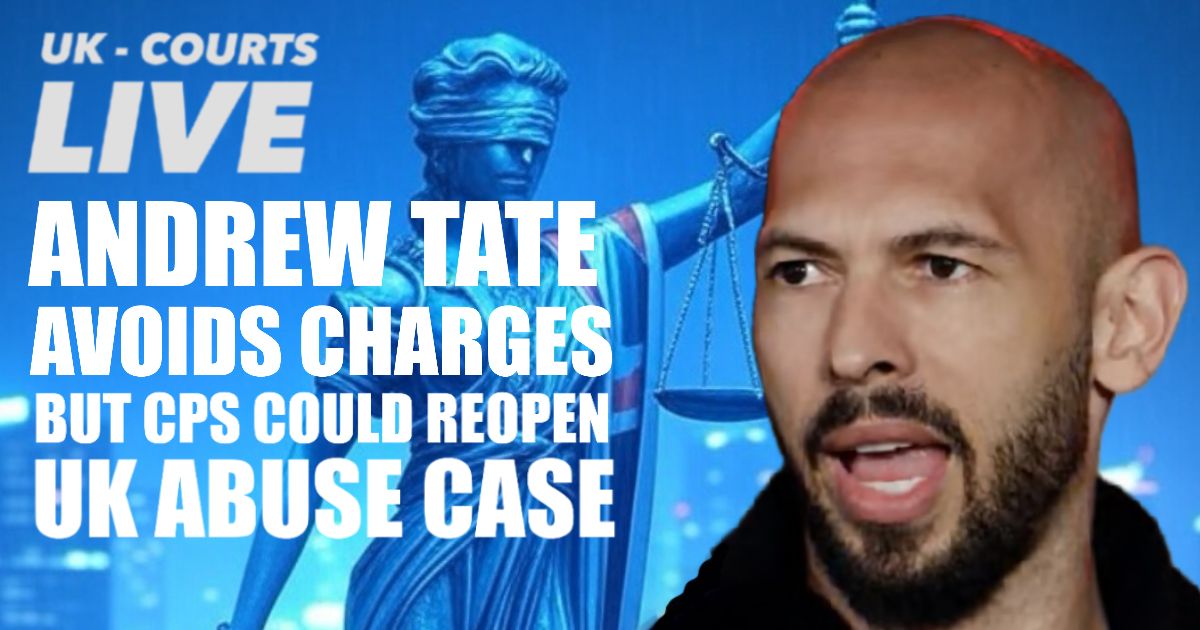🔴 Tate Not Charged — But CPS Could still Reopen UK Abuse Case?
CPS halts UK abuse case against Andrew Tate — but legal experts warn it’s far from over, as civil court evidence could still trigger a dramatic criminal U-turn.
Andrew Tate, the self-styled influencer whose name has become synonymous with online controversy, will for now face no criminal charges in the United Kingdom following the Crown Prosecution Service’s latest review of abuse allegations made by four women.
The CPS confirmed that, after reassessing evidence supplied by Hertfordshire Constabulary, the legal threshold to prosecute had not been met. Yet while this may appear on the surface to mark an end to the UK criminal investigation, in legal reality it remains only a temporary pause, not an acquittal.
The complainants, who are pursuing a separate civil claim at the High Court in London, accuse Tate of acts of sexual violence and coercive control said to have taken place between 2013 and 2015, including claims he assaulted one woman with a belt and pointed a gun at her.
Tate’s legal team has consistently denied all wrongdoing, maintaining that the allegations are fabricated.
His solicitor, Andrew Ford, welcomed the CPS’s stance, stating that despite “much external pressure”, the evidence had proved inadequate to support a realistic prospect of conviction.
The CPS’s decision, however, is not a declaration of innocence. It is a procedural assessment under the Code for Crown Prosecutors, which requires both evidential sufficiency and public interest before charges can proceed. The service’s wording does however leave open the possibility of reconsideration. Should new evidence emerge during the ongoing civil proceedings, or should the High Court’s findings lend additional weight to the complainants’ case, the CPS retains the authority to reopen its file. In essence, the matter has been placed in abeyance, not closure.
This distinction is critical. Civil litigation operates on a lower standard of proof — the balance of probabilities rather than the criminal threshold of beyond reasonable doubt. If the claimants succeed in demonstrating that it is more likely than not that the alleged acts occurred, that outcome could provide the CPS with grounds to re-evaluate its position. It would not constitute fresh evidence in itself, but the testimony and corroboration emerging from civil disclosure could substantially strengthen the evidential matrix.
The four women, represented by Matt Jury of McCue Jury & Partners, initiated their High Court action after the CPS first declined to prosecute in 2019. Three had made initial complaints to Hertfordshire Police, whose inquiry concluded that same year without charges.
Their decision to pursue civil recourse was intended to ensure some form of judicial scrutiny, irrespective of the CPS’s earlier findings. The claim seeks damages for alleged assault, sexual violence, coercive control and psychological harm.
Separately, the CPS has authorised a series of other charges against Tate and his brother Tristan in a separate case referred by Bedfordshire Police. Those proceedings relate to multiple alleged victims and include counts of rape, actual bodily harm, human trafficking and controlling prostitution for gain. European arrest warrants were issued in 2024, but extradition to the UK was deferred pending the outcome of concurrent proceedings in Romania, where both men were already under investigation.
From a procedural standpoint, this layered sequence of investigations underscores the complexity of parallel criminal and civil proceedings across jurisdictions. A decision not to prosecute in one context does not preclude subsequent action in another, particularly where additional material becomes available. The CPS’s statement was deliberately calibrated, signalling that its legal test is not static but subject to review as the evidential landscape evolves.
In effect, while Tate’s defence team may celebrate a reprieve, it remains a provisional one. The CPS’s wording leaves the door ajar for future reconsideration, particularly if the civil trial’s disclosures or findings yield fresh corroborative substance. Legally speaking, the case has not been “dropped” in the definitive sense often implied in public discourse; it is, instead, paused at an interim stage pending the natural progression of related civil proceedings.
For now, the criminal aspect of the Hertfordshire case is dormant. But as those High Court hearings unfold, the evidential balance could yet shift. In the intricate relationship between civil and criminal law, an outcome in one forum often reverberates within the other. Thus, while the influencer may claim vindication for the time being, his position before the UK justice system remains anything but settled.
Well, that’s all for now. But until our next article, please stay tuned, stay informed, but most of all stay safe, and I’ll see you then.




